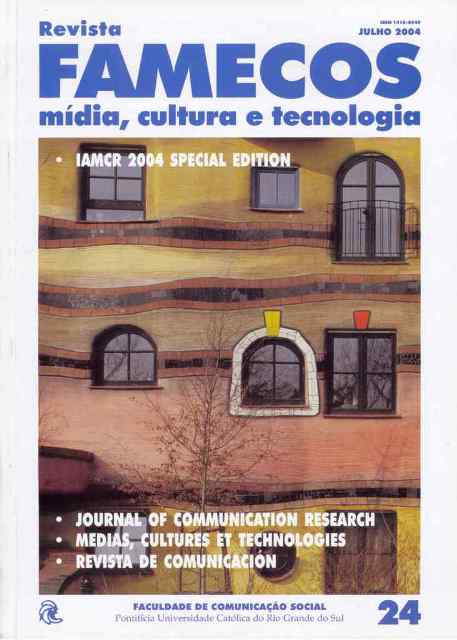Deliberate Confusion of Borders: On the Imaginary of Excess and Transgression in Cyberculture
DOI:
https://doi.org/10.15448/1980-3729.2004.24.3273Keywords:
Communication, Cyberculture, TransgressionAbstract
This article examines the notions of excess and transgression in the discourses of cyberculture. The hypothesis defended is that the libertarian and revolutionary rhetoric of cyberutopianisms conceals, in reality, an essentially conservative worldview and marked by the myths of the progressive modernization.Downloads
References
BATAILLE, Georges. A Parte Maldita, precedida de A Noção de Despesa. Rio de Janeiro: Imago, 1975.
CALABRESE, Omar. A Idade Neobarroca. Lisboa: Edições 70, 1988.
DAVIS, Erik. Techgnosis: Myth, Magic + Mysticism in the Age of Information. New York: Three Rivers Press, 1998.
HARAWAY, Donna. Manifesto Ciborgue. In: TADEO, Tomaz (org.). Antropologia do Ciborgue: as vertigens do pós-humano. Belo Horizonte: Autêntica, 2000. p. 33 - 118.
HAYLES, Katherine. How we Became Post-Human: Virtual Bodies in Cybernetics, Literature and Informatics. Chicago: The University of Chicago Press, 1999.
LEMOS, André. Cibercultura: Tecnologia e Vida Social na Cultura Contemporânea. Porto Alegre: Sulina, 2002.
LUPASCO, Stéphane. La Tragédie de l’Énergie. Paris: Casterman, 1970.
______.Logique et Contradiction. Paris: PUF, 1947.
SFEZ, Lucien. A Saúde Perfeita: Crítica de uma Nova Utopia. São Paulo: Loyola, 1996.
SHENK, David. Data Smog: Surviving the Information Glut. New York: Harper Edge, 1997.
SUBIRATS, Eduardo. Da Vanguarda ao Pós-Moderno. São Paulo: Nobel, 1986.
TERRANOVA, Tiziana. Post-Humam Unbounded: Artificial Evolution and High-Tech Subcultures. In: BELL, David; KENNEDY, Barbara (orgs.). The Cybercultures Reader. London: Routledge, 2002.
VAZ, Paulo. Agentes na Rede. Lugar Comum, n. 7. Rio de Janeiro: Nepcom/UFRJ, 1999.
WAITE, Geoff. Nietzsche’s Corps/e: Aesthetics, Politics, Prophecy, or, the Spectacular Technoculture of Everyday Life. Durham: Duke University Press, 1996.
Downloads
Published
How to Cite
Issue
Section
License
Copyright
The submission of originals to Revista Famecos implies the transfer by the authors of the right for publication. Authors retain copyright and grant the journal right of first publication. If the authors wish to include the same data into another publication, they must cite Revista Famecos as the site of original publication.
Creative Commons License
Except where otherwise specified, material published in this journal is licensed under a Creative Commons Attribution 4.0 International license, which allows unrestricted use, distribution and reproduction in any medium, provided the original publication is correctly cited.






